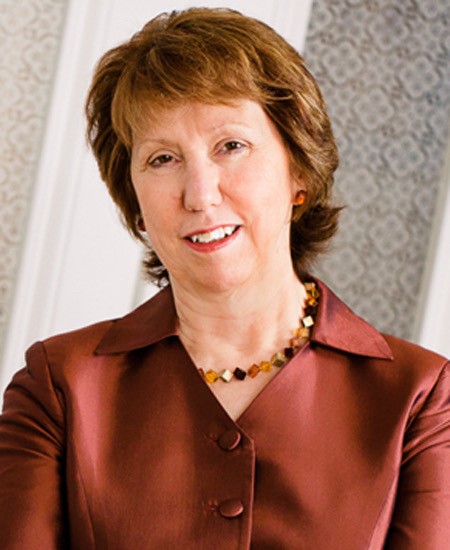
EVENT RECAP: Crisis in Ukraine – A Conversation with Baroness Catherine Ashton
On Wednesday, March 9 the American Security Project hosted a conversation with the Right Honourable Baroness Catherine Ashton, former European Union High Representative for Foreign Affairs and Security Policy. Baroness Ashton shared her views on the war in Ukraine, European perspectives on the conflict, alliance cohesion, and the risks of escalation.
The discussion opened with ASP CEO Patrick Costello asking Ashton to compare the response to Russia’s 2014 invasion of Ukraine and the divisions within the EU and NATO during that crisis to the alliance cohesion and united response to the current Ukraine-Russia war. Baroness Ashton responded by explaining how NATO was always willing to address the challenge, but the debate over how to respond came to weigh down the alliance. In that time, NATO has learned to adopt a two-pronged approach combining severe sanctions with maximum pressure on Russia to negotiate with Ukraine.
The war in Ukraine has created the largest refugee crisis in Europe since World War II. Baroness Ashton argues that the genuine desire of Europeans to help refugees is remarkable, but there will still need to be a concerted and coordinated plan to accommodate this massive influx of people. With the probability of this conflict enduring far into the future, Europe needs a long-term strategy.
Costello asked Baroness Ashton’s views of a no-fly zone over Ukraine. Ashton warned of the escalatory nature of any no-fly zone and the risks of NATO aircraft coming into direct conflict with Russian forces. A better option, Baroness Ashton posits, would be to support Ukrainian ground forces with equipment and materiel suited for urban warfare such as helmets, body armor, night vision goggles, ammunition, and small arms.
Costello also posed the question of how much pain Russia’s “fortress economy” can absorb before it begins to crumble to sanctions. Ashton noted that Putin has dismissed the personal effect of economic sanctions on his aims, but that the global effort to raise the costs for Russia’s invasion is more likely to have an effect on Russia’s oligarchs. She adds that sanctions will have a significant impact on the Russian people and in international energy markets, warning that the West will not be isolated from the costs associated with imposing sanctions.
This is a critical moment in global energy policy. Costello and Ashton discussed recent announcements to limit the flow of Russian oil—the U.S. announced a ban Russian oil imports, the EU is cutting back on Russian oil but won’t join the U.S. in a full ban, and the U.K. will phase it out by the end of the year. This moment may also serve to accelerate a transition to cleaner energy and accelerate the decarbonizing of our economy.
Asked about off-ramps and de-escalation, Ashton explained that the only viable off-ramps for this war must permit Putin to save face and offer something to the Russian people in order to justify the cost of this adventure. However, she maintained that any settlement must be palatable to Ukrainian President Volodymyr Zelensky and that the Ukrainians needed to have agency in the process—the settlement could not simply be one designed by the United States and Russia.
On Putin’s choice to place strategic nuclear forces on alert, Ashton contended that Putin’s nuclear alert level could be intended to send a variety of messages. While the move appears threatening, putting Russia’s nuclear forces into “special combat readiness” in not an inherently aggressive move and should be interpreted as a warning rather than as a direct threat.
Lastly, Costello and Baroness Ashton grappled with scenarios for invoking NATO’s Article 5, especially a Russian cyber offensive. On this issue, Baroness Ashton doubts that a cyber attack would trigger a full-blown NATO response as opposed to a coordinated non-military response, but she concluded with a warning on the uncertainty of the world in which we live.





